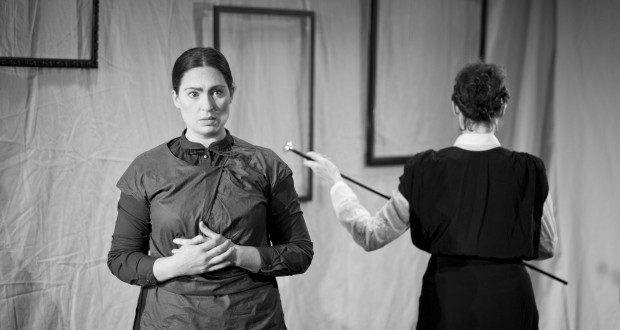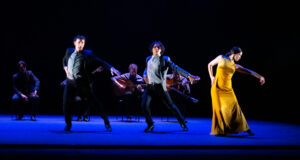Pros: A few strong performances, most notably by Nesba Crenshaw as the ferocious but also vulnerable matriarch Bernada.
Cons: The five sister’s characters could have been fleshed out more – even by the end I felt no sympathy or understanding for any of them. A bolder directorial approach would have brought more tension, substance and punch into a somewhat plodding performance.
Summary
Rating
Good
The mid-summer heat is pervasive as five sisters and their mother mourn the loss of the man of the house. Consumed by a sense of propriety and tradition, the widow Bernada Alba dictates that no one should leave her house for eight years. Cooped up in close proximity without a man in sight, the five sisters succumb to jealousy, petty squabbles and power struggles arising from sexual tension and boredom that lead to serious and horrific outcomes.
Written by Federico Garcia Lorca, in an adaption by David Hare, The House of Bernada Alba is set in Spain in the first decades of the twentieth century. The heat and the oppressive intimacy of the surroundings are symbolic for the women’s suppressed feelings and desires. Bernada rules the household with a iron fist and regularly falls into fits of cruelty and terrifying violence, adamant that her daughters, her servants and her mentally unstable elderly mother should not as much as raise their voices during the eight years of mourning. Only the youngest and prettiest of her daughters, Adela, still has some hope and spirit. When a handsome local man proposes to the eldest sister Angustias to secure her land and wealth for himself, the younger siblings cannot hide their envy and hate that threaten to tear the family apart. Accusations, theft and scenes of spitting hatred and anger follow.
Despite the dramatic story, the play plodded on a bit slowly for my liking. Some scenes dragged on a long time without adding much substance to the performance, which bolder directorial decisions by Scott Hurran might have avoided. The staging did not help – while the bare setting of the house nicely reflected the girls’ boredom, the crumpled white cloth lining the back of the stage seemed amateurish and reminded me of school-plays. It’s the first time I’ve been to the King’s Head Theatre, and while the auditorium is beautiful and sophisticated for a pub theatre, the stage itself was very narrow and the actors had to stand very close to the front row – meaning that anyone sitting further back could not see much if the characters sat or squatted on the stage.
That said I enjoyed Nesba Crenshaw’s performance as the matriarch Bernada. Crenshaw brought some humanity to the character, highlighting Bernada’s desire to protect her daughters from men’s society for their own good and demonstrating how vulnerable she ultimately is. I also liked the servants, whose cheerful banter contrasted well with the stiff and suppressed atmosphere in the Alba household. I was not quite as convinced by the daughters’ performances. Their characterisations fell a bit flat, and I neither understood nor pitied any of them by the end of the play. All in all, I missed the vibrancy, intensity and passion that a play about love, betrayal and suicide should bring with it.
Author: Federico Garcia Lorca
Adapted By: David Hare
Director: Scott Hurran
Producer: Ecclesia
Booking Until: This performance has now ended its run
 Everything Theatre Reviews, interviews and news for theatre lovers, London and beyond
Everything Theatre Reviews, interviews and news for theatre lovers, London and beyond




One comment
Pingback: June 2014 | Family journal